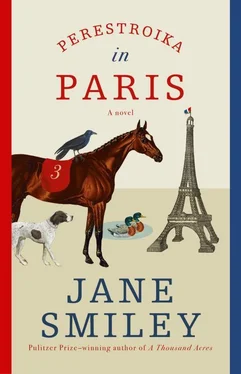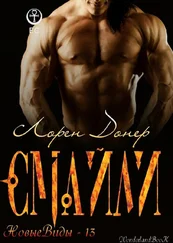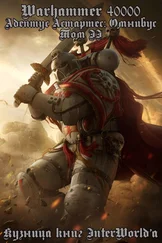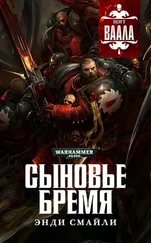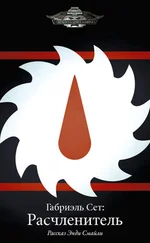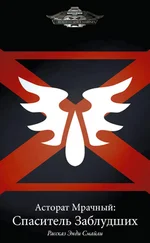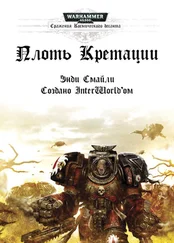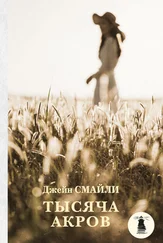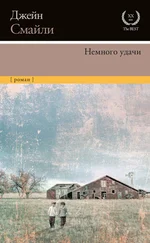ÉTIENNE AND KURT THOUGHT only about riding. When Étienne was not caring for his great-grandmama or hastily dusting here and wiping there, he was staring at Paras or sitting on her or stroking her with a soft rag. At least he ate. Kurt no longer knew himself. All he wanted to do, inside the house and outside, was entangle his four little feet in that thick mane and go about from place to place. His former greatest pleasure, eating, now looked to him like a waste of time, and as a result, nothing was left on his bones except muscle and fur. Frida lay in her corner in the courtyard and muttered and grumbled about rats’ knowing their place, and their place, if they were smart, was indoors. Even Conrad occasionally looked out the window on the second floor in dismay, but Kurt could not be stopped. He was delirious with pleasure and desire.
As for Paras, after her near-death experience, she was willing to do anything. Otherwise, she might have discouraged Kurt from running over her and sitting on her constantly, but his feet, light and tickly, reminded her that she was alive. Any reluctance she’d had about presenting herself at the sixth step to Étienne was completely gone—he fed her and gave her a place to live, he cleaned up after her (and the shrubbery and the raspberry patch had never looked more richly green), he talked to her about horses in the books he read. She owed him, if not her life, then her living. Paras thought she might like to chat with Raoul about her conflicting feelings—he would certainly have something to say, and even if it wasn’t relevant or helpful, the sound of his cawing would be soothing. But it was spring; he wasn’t making much progress on his new nest in the nearby plane tree—he was off doing ravenish things, whatever they were. Paras was happy, but her happiness felt like a scarf of morning mist floating above her, ready to blow away any minute.
Raoul had been seized by a desire for one last circuit. He had enjoyed visiting with his cousin Liam Corax Corvus, who lived in the Jardin des Plantes, so he flew there again, but though Liam was welcoming, the garden was as tame as could be. He longed for something more, one last adventure. Out to Vincennes was the obvious alternative, but just when he was almost there, just when he recognized his youthful haunts, he veered around and headed west. He flew and flew and flew—a long way for an old bird whose idea of a voyage was from the Place du Trocadéro to Montmartre, but he rather gloried in his power, the way he once had, at least until the very end, when he came to a screeching, plummeting, aching halt, and landed, pretty wobbly, in the middle of the training track at Maisons-Laffitte, gasping for air and stumbling across the sand, even as a large black horse galloped toward him. He closed his eyes, didn’t move—and the horse galloped on. He heard the rider exclaim, “Mon Dieu!,” and, with the last of his strength, he hopped up to the limb of a slender little tree and sat there, his wings trembling, wishing only for a drink, maybe his ultimate drink, of water. Some ravens, ones he didn’t recognize, gathered across the horse track, on a wire between two poles, but he could hardly lift his head, and so they chose to ignore him.
When Delphine got back to the barn, she told Rania what had happened—a raven had fallen out of the sky right in front of them, had not moved. Whiskey Shot, the English-bred three-year-old she was riding, galloped right over the bird without even flicking his ears, didn’t touch him, maybe didn’t notice him. Then they chatted about how you might think that birds would be falling out of the sky on a regular basis, but no one ever saw such a thing—it was peculiar. Whiskey was a bold horse, their great hope—entered in the Poule d’Essai des Poulains at Longchamp, the first horse Delphine had ever entered in a Group One race. And he was young, had turned three in April. He had plenty of growing to do.
Raoul sat for a long time in that small tree—long enough for the other ravens to finish one squabble and begin another. He found a puddle underneath a spigot on the edge of the course. He drank some (sandy) and paddled his feet around in it, refreshing himself a little bit. He was not quite sure where he was, but the ravens would tell him (while commenting on his ignorance) once he was revived enough to approach them. That was for later. For now, he flew back into the small tree, settled himself in the fork of one of the branches, and took the opportunity to survey the landscape. There were plenty of trees, and so there were many more Aves and of greater variety than he was familiar with in Paris. And they were all fat, especially the sparrows, the bee-eaters, the finches, the swallows swooping here and there. Wood pigeons, magpies, lapwings, even a furtive pheasant or two—never saw those in the Champ de Mars. He could see the outline of the head of a baby owl in a nearby tree, and then another one appeared beside it, peeping out. The mother would be nearby. Otherwise, there were horses everywhere. Several shot past him, but others came along more slowly, their riders curled on their necks. The horses progressed along several routes, not only the dirt track where he had landed. Some stood quietly with their riders, here and there, watching. He saw plenty of dogs, too, though attached to humans, not running free like Frida. And there were cats in the shadows. The world was full of cats—every Avis knew that. He could see a pair of them from this tree, gray and white, sliding around in the ragged grass. He adjusted his wings. He was beginning to feel stronger, and also rather proud of himself for making the trip.
He must have dozed off. When he woke up, he was thirsty again, so he flew down to the spigot, took another drink, investigated for and found an ant colony. And there was the carcass of a rabbit, a fair amount of dried meat on the bones, plus the tang of maggots and a most delicious carrion beetle. He was just pecking around for a few bits when shadows gathered above him, and a flock of something big landed in a pond on the other side of a small hill. Oh, mallards. He flew to the crest of the hill and looked down. It was a small group of drakes, well colored, fit, and sleek, homeward-bound, Raoul suspected. It was that time of year.
Just as Raoul was eavesdropping on their conversation about how far they had flown altogether—it was farther than last year, and, yes, that landscape off to the northwest there was an interesting one, an exceptional gathering place if you wanted to meet Aves from all over the world, but was it really worth going there, over so much ocean, and with the storms—if you went northeast, though, there were plenty of Aves from odd places—one of them said, “A little closer to home is better for me. I don’t like to stay away longer than I have to,” and all of the others squawked in mild skepticism, and then the mallard turned his head and stared at Raoul. Moments later, he stepped out of the water and strode up the hill, meep-meeping quietly: How are you, good heavens, what are you doing here, that can’t be you. Raoul was hard put to maintain his superior demeanor—embarrassingly, it was Sid who had recognized him, not the other way around. But this drake was not the Sid Raoul thought he knew, the screaming, panicked fellow who preened until half of his feathers were plucked. This Sid was easygoing and good-humored, a comfortable member of his cohort.
Sid seemed to be happy to see him. How are they? How many are there? I didn’t want to stop here, I just wanted to get home, is she okay, have any been taken, I hope not.
Raoul arranged himself as best he could, and said, “Sid, your offspring are too numerous to count, perfectly healthy as far as I can see, and awaiting your return.” Sid glanced back at the other mallards and sighed, then settled down beside Raoul. He said, “I think it will be a wonderful summer. I’ve gotten a lot of counseling this trip. I feel more in control and better prepared for the chaos. I am up to the challenge.”
Читать дальше
